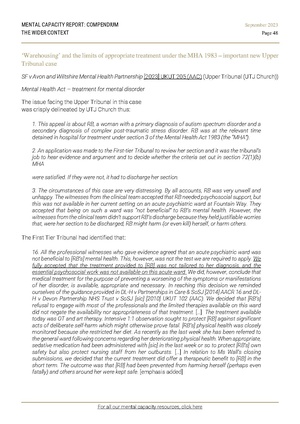SF v Avon and Wiltshire Mental Health Partnership NHS Trust [2023] UKUT 205 (AAC)
Thanks
Thanks to Angela Wall (Butler Solicitors, solicitor for SF) for providing the judgment.
Judicial summary from Gov.uk
Conditions to continued detention - Mental Health Act 1983 s72(1)(b)(iia) – requirement that ‘appropriate medical treatment’ be available in hospital – whether treatment provided with the aim of keeping the patient ‘physically well, safe and protect those seeking to care for her’ (but no more) satisfied the requirement for therapeutic intent – whether the tribunal was entitled to find that the treatment available in hospital was ‘appropriate’ in circumstances where it had identified treatment which it found to be “essential” but that treatment was not available in the hospital where the patient was detained.
Essex
This case has been summarised on page 48 of 39 Essex Chambers, 'Mental Capacity Report' (issue 134, September 2023).
ICLR
The ICLR have kindly agreed for their WLR (D) case report to be reproduced below. For full details, see their index card for this case.
The WLR Daily case summaries
Upper Tribunal
SF v Avon and Wiltshire Mental Health Partnership NHS Trust
2023 April 20; Aug 16
Upper Tribunal Judge Church
Mental health— Hospital treatment— Compulsory detention— Patient detained in hospital for mental health treatment— Hospital refusing discharge request made by mother of patient— First-tier Tribunal upholding decision of hospital despite finding patient’s treatment plan not tailored to her diagnosis and essential psychosocial work not available— Whether treatment to prevent physical harm to patient and others “appropriate medical treatment” satisfying conditions for continued detention of patient— Mental Health Act 1983 (c 20), ss 72(1)(b)(iia), 145(4)
A patient diagnosed with autism spectrum disorder and post-traumatic stress disorder, with symptoms of self-harming and violent behaviour, was detained in a hospital operated by the NHS trust for treatment under section 3 of the Mental Health Act 1983. The patient’s treatment plan consisted of occupational therapy, art therapy, intensive 1:1 observation, monitoring of her physical health, administration of sedative medication and discharge planning. The patient’s mother gave notice to the hospital managers of the NHS trust of her intention to order the discharge of the patient from detention under section 23 of the 1983 Act. However, the responsible clinician issued a barring report stating that the patient was likely to act in a manner dangerous to other persons or herself if discharged. The effect of the report was to prevent the mother from exercising her power of discharge for the next six months. The patient’s mother then applied to the First-tier Tribunal under section 66(1)(g) of the 1983 Act for the discharge of the patient from the hospital on the basis that appropriate medical treatment was not available to her there. The tribunal found that the patient’s treatment plan was not tailored to her diagnosis, that essential psychosocial work was not available to her in her current setting and that the purpose of the treatment provided to her related solely to concerns for her physical health and safety and the physical safety of staff that cared for her. The tribunal nonetheless refused the mother’s application, and upheld the patient’s detention, on the ground that appropriate medical treatment was available to her at the hospital for the purpose of preventing a worsening of her symptoms and manifestations, within the meaning of sections 72(1)(b)(iia) and 145(4) of the 1983 Act.
On appeal by the patient’s mother—
Held, appeal allowed. Appropriate medical treatment within section 72(1)(b)(iia) of the Mental Health Act 1983 referred to treatment that was appropriate to the relevant patient’s particular needs. While restraint, whether physical, mechanical or chemical, could form a legitimate part of a patient’s treatment plan, it did not necessarily amount to “medical treatment” in the 1983 Act sense of treatment with the purpose of preventing a worsening of relevant symptom or manifestation of a patient. The requirement that “appropriate medical treatment” be available, as a criterion for the lawfulness of detention for treatment, was a crucial element of the protections provided by the 1983 Act and that requirement, construed in its statutory context and according to the underlying statutory purpose, could not be satisfied simply by confining someone with a mental disorder in a way that prevented them from engaging in risky behaviour that arose from a symptom or manifestation of their mental disorder. In the case of a neurodiverse patient, restraint was unlikely to have the purpose of preventing a worsening of relevant symptom or manifestations since restraint was likely to exacerbate such a patient’s frustration and need for control and increase their anxiety. To interpret the statutory provisions as permitting detention where the only treatment available was provided for the purpose of maintaining physical safety, without treating the mental disorder itself, would frustrate the statutory purpose. In the present case, the findings of the First-tier Tribunal that “essential” psychosocial treatment was not available for the patient in the hospital, and that the present treatment plan was not tailored to the patient’s diagnosis, meant that the treatment that was available was not, by itself, appropriate. The tribunal had therefore erred in law in deciding that appropriate medical treatment was available to the patient at the hospital (paras 25, 36, 41, 42, 49–51, 54).
Rooman v Belgium [2020] MHLR 1, ECtHR (GC) applied.
Roger Pezzani (instructed by Butler & Co Solicitors, Taunton) for the mother.
The NHS trust and the patient did not appear and were not represented.
Jeen Ann Young, Barrister
Referenced Legislation
Mental Health Act 1983 (c 20), ss 72(1)(b)(iia), 145(4)
External links
Full judgment: BAILII
Download here
Subject(s):
Date: August 2023🔍
Court: Upper Tribunal (Administrative Appeals Chamber)🔍
Judge(s):
- Thomas Church🔍
Parties:
Citation number(s):
What links here:Published: 24/8/23 00:35
Cached: 2024-05-03 02:00:35
